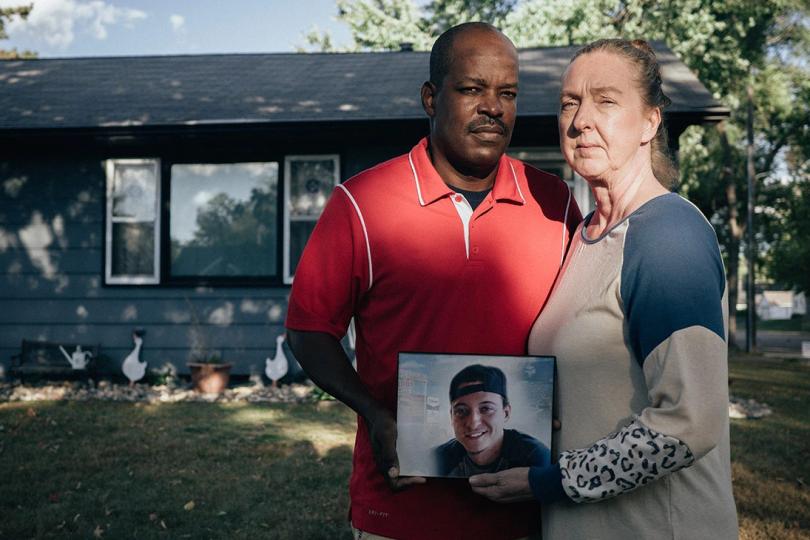Filming Truth to Power

Three years since COVID, the struggle to adequately combat the inequities that the pandemic laid bare persists. Economic strife, political sectarianism, and clinical exhaustion have become normalized to a frightening degree heretofore unseen in the modern era. The question, then, is what can filmmaking do to not only educate audiences about the root causes of socioeconomic disparities in the United States, but to galvanize them into action?
A selection of films featured in this year’s Minneapolis-Saint Paul International Film Festival go some way toward providing a possible answer to this question, collectively drawing upon a historical narrative wherein Minnesotans are not merely observers of history but active agents that change its course. One prominent figure is Nowa Cumig, also known by Dennis Banks. The co-founder of the American Indian Movement (AIM), his work as an activist provides the basis for Ojibwa Warrior: The Legacy of Dennis Banks. Interspersing archival footage with excerpts from Banks’ book of the same name, director Marie-Michele Jasmin-Belisle mounts a stirring snapshot of the ways the Minneapolis-based organization played a crucial role in several Indigenous-led movements in the latter half of the 20th century.
“He was really more or less a spokesperson for doing the right thing”, Programmer Craig Laurence Rice said of Banks. Rice programs several films for MSPIFF highlighting new and diverse voices in American Cinema. Yet he vividly recalls growing up, as a person of color, that the primary directive was to “mind your own business, just stay quiet and get along.” Activists like Banks challenged that longstanding assertion, and Rice hopes that young audiences, particularly BIPOC students, can gain several lessons from Banks’ story. The most important lesson? “Once you start to see what really is going on in and around you and what America has done to you…it’s important to start seeing that and start stand[ing] up for yourself,” Rice explains.
Awareness of state violence practiced against communities of color is also present in Brutal Utopias. Curated as the centerpiece of the Space & Time shorts program, the film condenses a nearly forgotten chapter of Minneapolis history into a riveting 34-minute morsel. Morgan Adamson’s succinct yet revealing examination of the construction of the Cedar-Riverside Plaza in 1971, and its ensuing controversy, casts a light on the complex legacy of urban renewal in the United States, particularly in what communities it supports and which it displaces.
“I went to grad school at the University of Minnesota,” Adamson explains. “I spent a lot of time on the West Bank in my twenties and thirties and fell in love with the neighborhood and had heard the mythos about those buildings and their origins and this bigger plan for the neighborhood.” It was only after digging into the unorganized papers of Ralph Rapson, the architect behind the proposed 100-acre spread of high-rises, that Adamson became interested in understanding why Rapson’s vision never came to fruition, and, more importantly, who stopped it.
The responsible party, Morgan discovered, were primarily anti-war activists and anarchists who convened at the Cedar-Riverside Café, today the privately-owned Acadia Café. “So many people on the West Bank were really open,” Morganson says of the activists whose voiceover testimony guides the film’s narrative. “I worked with Acadia, I worked with the Riverside Plaza Tenants Association who helped get me access to filming inside the [Riverside Plaza] towers, and the West Bank Community Development Corporation, which was the organization that grew out of the activist movement.”
While Brutal Utopias dedicates most of its runtime to examining the past, the film’s final portion turns its focus on the Somali community that has settled in the Cedar-Riverside plaza, long after Rapson and the city of Minneapolis abandoned plans to fulfill his vision. “Rapson’s utopian vision really did end up serving the population, though it wasn’t the population it was intended for,” Adamson notes. That ironic wrinkle fuels the film’s parting question to the audience, one that asks “how we can think about social life beyond housing that is random and haphazard and only [serves] the developers.”
That form of imagining new possibilities in the present tense encompasses the urgent mission of another documentary, Pay or Die, this time in relation to health care. The film chronicles the lives of Americans spread throughout the nation who all, either directly or indirectly, have been impacted by Type 1 Diabetes. The fulcrum of the film’s righteous fury belongs primarily to Nicole Smith-Holt and James Holt Jr, the Richfield couple whose son Alec died at 26 when he began doling out his insulin after losing access to his parents’ health insurance. His death triggered a crusade waged by the Holt family against the pharmaceutical companies whose unethical price gouging has left millions of Americans struggling to survive.
This endemic is a point of personal interest for the filmmakers behind Pay or Die. Scott Ruderman was diagnosed with Type 1 Diabetes when he was 19 years old and has been forced to integrate living with the disease into his filmmaking practice. “Diabetes is all about management. It's not like I give myself a shot and I'm free for the day,” Ruderman explains. “Type one diabetes affects my life in all aspects, physically, emotionally and financially.” Rachael Dyer, the film’s co-director and Ruderman’s life partner, is a dual Canadian-Australian citizen working and living in the US. For her, “it has been a huge adjustment… to have to understand the medical system and how it works here.” What’s she’s observed has left her “gob smacked.”
Ruderman and Dyer hope that the film’s festival run will sustain a much-needed dialogue on health care reform, particularly as another election year draws close. But “bringing the film home” to MSPIFF is, according to Ruderman, “really exciting for us because it is the backyard of James and Nicole. They’ve done so much in the state of Minnesota, and they have such a voice there, I think it’s going to lend itself to a lot of discussion.” Dyer adds that the film’s MSPIFF premiere will provide “a huge opportunity for people coming to watch it in Minnesota to say the fight is not over… All of the wonderful work that Nicoel and James have done in Minnesota with the Alec Smight Emergency Insulin Act is fantastic. But we can’t stop [at] that. We need to move now [towards] federal legislation]…”
What change can be spurred on by the film, or by any film for that matter, remains to be seen. Yet by reviving tales from the past, and by making immediate the stakes of the present, these filmmakers may just help Minnesotans begin to think about their role in creating a more just future.
For more information on when the films will screen, check out the listings here.




